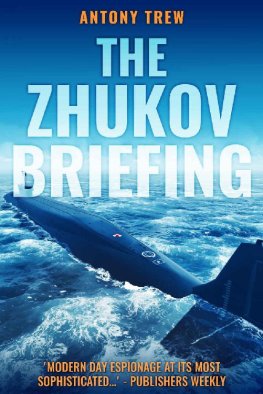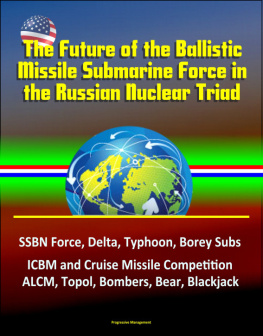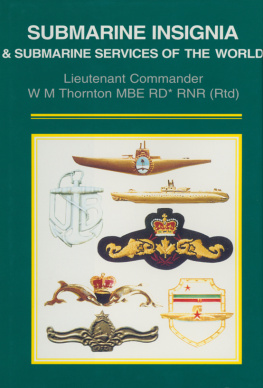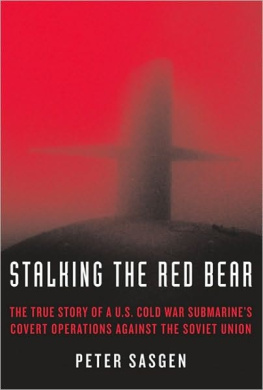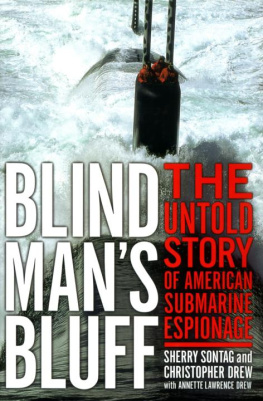Antony Trew
THE ZHUKOV BRIEFING

There has been nothing in the past 20 years which has upset the balance of power so violently and so fundamentally as the emergence of the Soviet Union as the second largest naval power in the world, with a navy nearly twice as numerous as the combined navies of Britain, France, West Germany, Italy and Japan. This navy has become a force able to take part in any kind of war Russia desires, from an all-out nuclear conflict, to gun-running on behalf of local communist parties or their friends anywhere in the world.
David Woodward in The Listener, 7th November, 1974
Entry in the movements log of the Flag Officer Commanding New Construction, USSR Baltic Fleet, Leningrad Naval Base:
1st October, 1974BMS Zhukov
20:35 Zhukov cleared submarine pens.
21:02 Zhukov completed passage Morskoy Kanal.
21:17 Forts Pavel and Pyotr report Zhukov crossing anti-submarine defence loop 47g.
22:15 ASD, sonar and radar stations at Karavalday and Flotskiy report Zhukov crossing anti-submarine defence loop 23e.
22:29 Guardship Tolstoi reports Zhukov clear of inner defences.
Note: Refer signal log for message C-in-C, Baltic Fleet, repeated C-in-C Northern Fleet, reporting departure of Zhukov on familiarization patrol en route to Polyarnyo to join Seventh BMS Squadron, Northern Fleet ref. 21:30/10-1/BMS 7.
Office of the Commodore (Intelligence), Ministry of Defence (Navy), Whitehall:
Entry dated 4th October, 1974, in Top Secret file BMS/USSR/Delta Two/2713a: Agent Clematis reports sailing of first operational Delta Two ballistic missile submarine Zhukov from Leningrad Naval Base during the night of October 1st. Believed bound Polyarnyo to join Seventh BMS Squadron, Northern Fleet. Clematis confirms structural and equipment defects revealed on summer sea trials now made good in Zhukov at Zhdanov Yard but work on Timoshenko unlikely to complete before end November. Principal defects in both apparently due technical problems welding new type alloys in pressure hull. Clematis regrets unable obtain information on structure abaft bridge fin, twin blisters forward of tailfin, and missile warheads as directed last briefing and considers success unlikely in view exceptionally high security classification.
C-in-C Fleet, Northwood, informed 09:17/4/-R/BMS/OPS.
THE FIRST DAY
Soon after midnight Krasnovs voice came through on the speaker: Sonar bearing zero-two-seven. Range eighteen kilometres. Classified single screw diesel. Bearing moving left.
In the dim red light of the control-room Sergei Yenev, captain of the Zhukov, transferred his attention from the systems console to the sonar screen repeater. With trained eyes he scanned the abstract patterns of light acquired by the submarines transducers as they probed the sea ahead. To starboard the cluster of the Vesteralen Islands showed in a glowing broken line: an isolated neon speck fine on the bow was Vrakoy, the outermost of them all. In the few minutes since hed last viewed the screen the only changes were those of relative movement. There were still five ships to starboard, two to port, and some smaller pips which had been classified as fishing boats.
Yenev watched the darting neon strobe which drew attention to the new contact: a pinpoint of light, glowing and fading like a firefly as it emerged from behind Vrakoy. Zhukovs sonar range was sixty kilometres; but the contact, masked by the island, had been picked up at only eighteen.
The buzzer on the receiver bleeped. Contact now zero-three-five, range sixteen kilometres, single screw diesel, announced a disembodied voice. Check sound signature, ordered Yenev.
In the sonar room Ivan Krasnovs sensitive face broke into a grimace. Of course hed check the sound signature. He was already doing it. Why did Yenev always order what was routine procedure as if hed suddenly come up with an inspired idea? The young lieutenants elegant fingers punched away at the computer keys with the ease and grace of a concert pianist. Seconds later he pulled the flexible neck of the mike closer and read aloud from the print-out. Targets course and speed two-seven-three speed seventeen knots computer comparison with sound signatures of Soviet and NATO fleet auxiliaries negative repeat negative. Classification large single screw commercial tanker.
In the control-room Yenev acknowledged the report with a terse, Good. Disregard. Resume normal scanning.
Resume normal scanning, echoed Krasnov, jerking his chin outwards and upwards as if exercising his neck muscles.
Yenev decided to speak to Krasnov about the report later. The lieutenant should have given the sound signature first. That was what Yenev had ordered. It was top priority. Target data should have followed. Yenev respected Krasnovs ability. He was a good sonar and torpedo officer, but like many graduate entries his manner suggested that academic skills placed him in a category above the seamen officers whod qualified in the naval academies. And so at times, among other things, he disregarded well tried naval procedures. What the captain didnt know was that Krasnov was unhappy in the navy. The young man wished fervently hed taken a degree in arts and not physics. He was an intellectual, by nature a philosopher. But his father, a retired naval petty officer with understandable ambitions for his son, had more or less pushed him into physics and the navy.
Yenev scratched his sandy en brosse hair and shifted his attention to the plotting table. The head scratching was a familiar gesture. Because of it the crew called him old dandruff, in spite of his thirty-five years and the conspicuous absence of dandruff from the blue collar of his uniform jacket.
A chart of the Norwegian Sea showed under the glass on the plotting table. An electronic trace-arm, fed by SINS, the ships inertial navigating system, moved slowly ahead leaving a spidery line representing the submarines track. It showed that Zhukov was keeping to seaward of the two hundred metre line as she moved up the Norwegian coast.
Sergei Yenev was a conscientious captain and though he knew that SINS with its fail-safe and back-up systems showed the exact geographical position of the submarine at any moment, when close to land he often double and treble checked the position by sonar, radar, and visual bearings at periscope depth.
The clock above the plotting table showed 0010. Next check at 0020, he reminded himself as he watched the flickering figures on the ocean-depth-recorder and compared them with those on the chart: 1440 1500 1620 metres.
Good, he muttered. Yenev had the submariners instinctive liking for deep water. Zhukov was on a northerly course, running parallel to the Vesteralen Islands which led on from the Lofoten Wall. Average distance of the land to starboard was 30 kilometres. They would pass within 15 kilometres of Vrakoy. Quite close enough, he decided. He was never happy near the land although theyd be in almost 1000 metres of water off Vrakoy. But it was important that the crew should have every opportunity of becoming familiar with Zhukovs complex electronic systems and that was one reason why he was inshore. There was another, a more important one. Soviet Naval Intelligence believed there was an anti-submarine minefield between Vrakoy and the island of Andoy to the west. Zhukovs sonar could prove or disprove this if she came close enough inshore. Norwegian territorial waters extended 20 kilometres to seaward and, by taking his submarine within 15 kilometres of Vrakoy, Yenev would be infringing Norwegian territorial rights. Norway was highly sensitive about these but that was not Yenevs concern. He had his orders and would carry them out.

